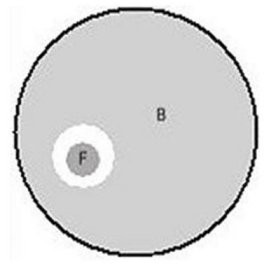 Figure 14.1 represents a Petri dish with a fungus (F), shown in darker gray, growing in the midst of bacterial lawn (B), shown in light gray. Both microbes were from the same patient sample. The relationship between the fungus and the bacteria would best be described as
Figure 14.1 represents a Petri dish with a fungus (F), shown in darker gray, growing in the midst of bacterial lawn (B), shown in light gray. Both microbes were from the same patient sample. The relationship between the fungus and the bacteria would best be described as
A. mutualistic.
B. amensal.
C. commensal.
D. parasitic.
E. None, there is no relationship between the microbes.
Answer: B
You might also like to view...
Enzymes aid in metabolism by ____
a. changing the DG of the reaction b. adding additional reactants to the system c. slowing the rate of some reactions and increasing the rate of other reactions d. stabilizing the transition state e. removing unused reactants from the system
The letter “D” in the above figure represents
a. photosynthetic cell. b. cuticle. c. epidermal cell. d. leaf surface. e. none of these.
Plants are susceptible to bacterial infections, which can damage their structure or even kill them. Which of the following would be the best antibiotic to treat a plant that is infected with bacteria?
A) a drug that interferes with mitochondria function B) a drug that disrupts cell wall structure and function C) a drug that destroys the central vacuole D) a drug that blocks gene expression in circular chromosomes
Mesozoic
What will be an ideal response?